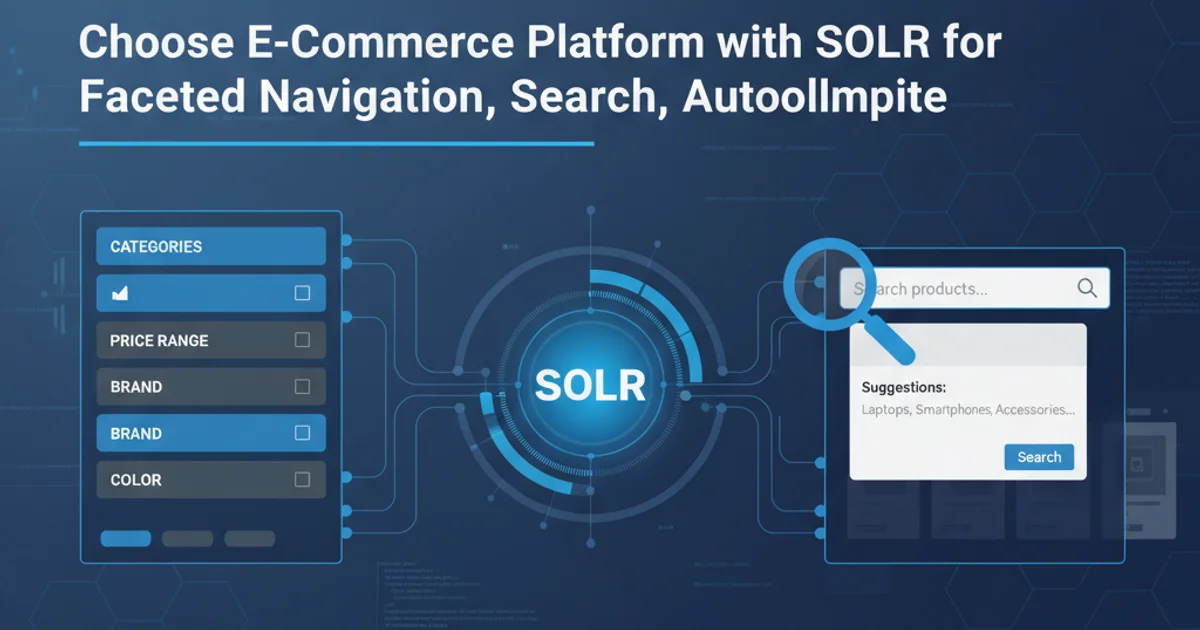Choose E-Commerce Platform with SOLR for Faceted Navigation,Search,Autocomplete
Categories:
Supercharge Your E-Commerce: SOLR for Advanced Search & Navigation

Explore how integrating Apache SOLR with your e-commerce platform (like Magento or NopCommerce) can revolutionize faceted navigation, search, and autocomplete functionalities, providing an unparalleled user experience.
In today's competitive e-commerce landscape, a robust and intuitive search experience is paramount. Customers expect lightning-fast results, intelligent suggestions, and the ability to filter products with precision. Traditional database-driven search often falls short, especially with large product catalogs. This is where Apache SOLR, a powerful open-source enterprise search platform, comes into play. By offloading complex search operations to SOLR, e-commerce platforms can deliver superior performance, advanced faceted navigation, and highly accurate autocomplete features, significantly enhancing the user journey and conversion rates.
Why SOLR for E-Commerce Search?
SOLR is built on Apache Lucene, providing full-text search capabilities, hit highlighting, faceted search, near real-time indexing, dynamic clustering, database integration, and rich document handling. For e-commerce, its advantages are clear:
flowchart TD
A[User Query] --> B{E-commerce Platform}
B --> C{SOLR Indexing Service}
C --> D[SOLR Core (Product Data)]
D -- Faceted Search --> E[Filtered Results]
D -- Autocomplete --> F[Search Suggestions]
D -- Full-Text Search --> G[Relevant Products]
E & F & G --> H{E-commerce Frontend}
H --> I[Enhanced User Experience]SOLR Integration for E-commerce Search Flow
Implementing Faceted Navigation with SOLR
Faceted navigation allows users to refine search results by applying multiple filters (facets) based on product attributes like brand, price, color, size, or category. SOLR excels at this, providing fast and accurate facet counts even across millions of products. When a user applies a filter, SOLR quickly re-calculates the available options and their counts for the remaining facets, ensuring a dynamic and responsive filtering experience.
<!-- Example SOLR schema.xml field definition for a facet -->
<field name="brand_s" type="string" indexed="true" stored="true" multiValued="true" />
<field name="price_f" type="float" indexed="true" stored="true" />
<!-- Example dynamic field for faceted attributes -->
<dynamicField name="*_attr_s" type="string" indexed="true" stored="true" multiValued="true" />
Defining fields for faceted search in SOLR's schema.xml
Advanced Search and Autocomplete Features
Beyond basic keyword search, SOLR enables sophisticated search capabilities:
- Full-Text Search: Highly relevant results based on product descriptions, names, and other textual attributes.
- Synonyms: Mapping common search terms to product-specific keywords (e.g., 'sneakers' to 'athletic shoes').
- Stop Words: Ignoring common words like 'a', 'the', 'is' to improve relevance.
- Spell Check & Suggestions: Offering 'Did you mean?' suggestions for misspelled queries.
- Autocomplete/Type-ahead: Providing real-time search suggestions as the user types, significantly speeding up product discovery. This often involves a dedicated 'autocomplete' SOLR core or specific field configurations.
<?php
// Example PHP (Magento/NopCommerce integration logic would be more complex)
$solrQuery = new SolrQuery();
$solrQuery->setQuery('product_name:"' . $_GET['q'] . '" OR description:"' . $_GET['q'] . '"');
$solrQuery->addFacetField('brand_s');
$solrQuery->addFacetField('category_s');
$solrQuery->setFacetMinCount(1);
$solrQuery->setRows(20);
// For autocomplete, a separate query might target a 'suggest' field
// $solrQuery->setQuery('suggest_field:' . $_GET['q'] . '*');
$solrClient = new SolrClient(['hostname' => 'localhost', 'port' => 8983, 'path' => '/solr/my_products']);
$queryResponse = $solrClient->query($solrQuery);
$response = $queryResponse->getResponse();
// Process $response->response->docs for products and $response->facet_counts for facets
?>
Simplified PHP example for querying SOLR with facets
Integrating SOLR with E-commerce Platforms (Magento, NopCommerce)
Both Magento and NopCommerce have established methods for integrating with SOLR, often through extensions or custom development. These integrations typically involve:
- Data Export/Indexing: A process to extract product data from the e-commerce platform's database and push it into SOLR. This can be done via cron jobs for batch indexing or real-time updates for new products.
- Search Query Redirection: Modifying the platform's default search functionality to send queries to SOLR instead of the internal database.
- Result Processing: Parsing SOLR's JSON or XML responses and rendering them within the e-commerce platform's frontend templates.
- Faceted Navigation Integration: Dynamically building the facet filters and counts based on SOLR's facet response.
- Autocomplete Hookup: Connecting the search bar's input events to SOLR's suggest handlers.
1. Set up SOLR Server
Install Apache SOLR on a dedicated server or within your existing infrastructure. Configure the necessary SOLR cores for your product data.
2. Design SOLR Schema
Create a schema.xml (or managed schema) that accurately reflects your product attributes, including fields for full-text search, facets, and autocomplete.
3. Develop Data Indexer
Write a script or use an existing extension to extract product data from your e-commerce platform's database and index it into your SOLR core. Ensure this process handles updates and deletions.
4. Integrate Search Frontend
Modify your e-commerce platform's search functionality to send user queries to SOLR. Parse the SOLR response and display results, including product listings, facets, and autocomplete suggestions.
5. Optimize and Monitor
Continuously monitor SOLR performance, optimize queries, and refine your schema and indexing strategy based on user behavior and search analytics.